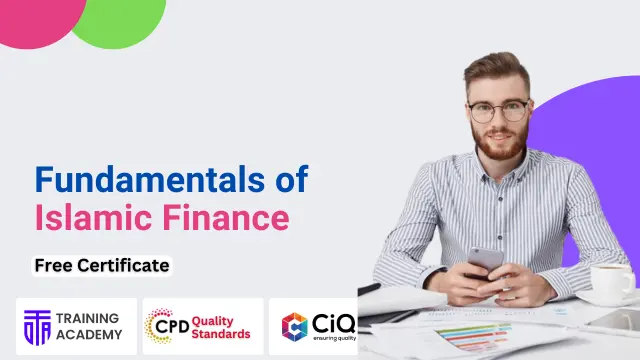
Fundamentals of Islamic Finance
CPD Accredited ! Free Certification | FREE Retake Exam | Lifetime Access | No Hidden Fees
Online Training Academy
Summary
- Digital certificate - Free
- Reed Courses Certificate of Completion - Free
- Tutor is available to students
Add to basket or enquire
Overview
Unlock the fundamentals of Islamic finance with our comprehensive online course. Whether you're new to the field or seeking to deepen your understanding, this course offers a structured exploration into the principles that govern ethical financial practices in Islam.
Key Features:
- CPD Certified
- Free Certificate from Reed
- CIQ Approved
- Developed by Specialist
- Lifetime Access
Certificates
Digital certificate
Digital certificate - Included
Reed Courses Certificate of Completion
Digital certificate - Included
Will be downloadable when all lectures have been completed.
CPD
Curriculum
Course media
Description
In this course on Fundamentals of Islamic Finance, learners delve into the ethical principles and operational framework of financial practices aligned with Islamic law (Shariah). They explore the fundamental concepts that distinguish Islamic finance from conventional finance, such as the prohibition of interest (riba) and the emphasis on profit-sharing arrangements (mudarabah and musharakah). The course covers practical applications of Islamic finance in various financial products and services, including Takaful (Islamic insurance) and Islamic funds. It also addresses risk management strategies unique to Islamic finance contexts. Learners gain insights into the adaptation and implementation of Islamic financial principles within the regulatory environment of the United Kingdom.
Overall, the curriculum equips learners with a comprehensive understanding of how Islamic finance operates ethically and effectively within global financial systems, preparing them to navigate and contribute to this specialized field.
Course Curriculum
- Module 01: Ethics and Principles of Islamic Finance
- Module 02: Fundamentals of Islamic Finance
- Module 03: Islamic Finance in Practice
- Module 04: Takaful
- Module 05: Islamic Funds and Risk Management
- Module 06: Islamic Finance in the UK
Learning Outcomes:
- Explain key principles of Islamic finance ethics and regulations confidently.
- Apply fundamental concepts of Islamic finance in theoretical scenarios effectively.
- Analyse practical applications of Islamic finance principles in real-world contexts.
- Describe the principles and operations of Takaful insurance accurately.
- Evaluate risk management strategies within Islamic funds comprehensively.
- Discuss the development and challenges of Islamic finance in the UK.
Who is this course for?
- Financial professionals seeking knowledge in Islamic finance principles.
- Students interested in understanding ethical financial practices in Islamic contexts.
- Researchers exploring the application of Sharia-compliant finance in global markets.
- Individuals pursuing careers in Islamic banking and finance sectors.
- Consultants advising on financial services compliant with Islamic law.
Career path
- Islamic Finance Analyst
- Sharia Compliance Officer
- Takaful Insurance Specialist
- Islamic Investment Advisor
- Financial Risk Manager
- Islamic Finance Consultant
Questions and answers
Currently there are no Q&As for this course. Be the first to ask a question.
Reviews
Currently there are no reviews for this course. Be the first to leave a review.
Legal information
This course is advertised on reed.co.uk by the Course Provider, whose terms and conditions apply. Purchases are made directly from the Course Provider, and as such, content and materials are supplied by the Course Provider directly. Reed is acting as agent and not reseller in relation to this course. Reed's only responsibility is to facilitate your payment for the course. It is your responsibility to review and agree to the Course Provider's terms and conditions and satisfy yourself as to the suitability of the course you intend to purchase. Reed will not have any responsibility for the content of the course and/or associated materials.


